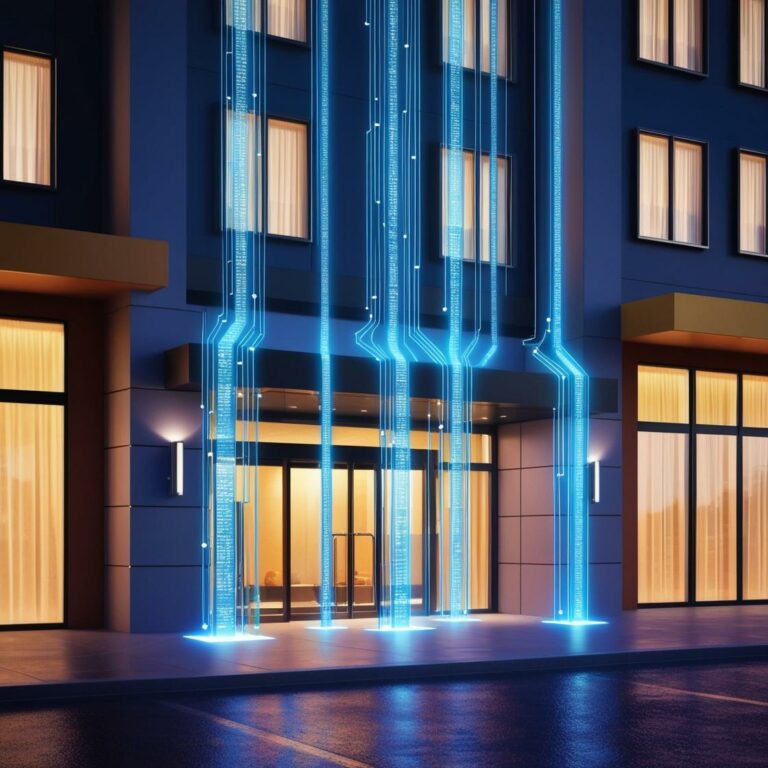
Customer experience is key, and efficient data management has become essential for hotel establishments. Data centralisation plays a crucial role in providing a complete integrated view of every operational and relational aspect.
By avoiding information silos and fragmented data, hotels can optimise their management but also enhance the quality of service offered to their guests. This article explores why data centralisation is essential for hotel management.
We will highlight its specific benefits and strategies to maximise this practice. Discover how a centralised approach can turn every customer interaction into an opportunity for loyalty and growth for your hotels.
1. Understanding Data Centralisation
Data centralisation is the process of gathering all information related to hotel operations into a single and accessible point. This contrasts with a decentralised approach, where information is scattered across different systems or departments, making access and analysis more complex.
Data centralisation offers several key benefits, including a unified global view of the customer that integrates important details such as room preferences, stay history, and past interactions. This facilitates personalised service while improving the consistency and speed of responses to customer needs.
Additionally, centralisation reduces data management errors by minimising redundancy and contradictions often found with fragmented information. It ensures better coordination between different hotel departments, from reservations and operations to marketing.
With a centralised database, hotels can also identify opportunities for continuous improvement by leveraging insights from comprehensive, integrated data. This ability to extract meaningful insights helps better understand customer trends and anticipate their needs, making the establishment more agile and competitive in the market.
2. Improving Operational Management
Data centralisation significantly transforms operational management in hotels, enabling smoother and more efficient coordination between different departments. By integrating all relevant information into a single system, hotels gain a coherent overview of daily operations.
A centralised database facilitates the optimisation of reservation and service management. With immediate access to customer information, staff can check availability, room preferences, and even special requirements in real-time, ensuring prompt and personalised service.
Moreover, data centralisation eliminates information silos, reducing the risk of errors that can occur when departments work with fragmented information. Whether managing inventory, coordinating events, or adjusting room pricing, all decisions can be based on consistent and reliable data.
By integrating management systems into a single platform, hotels can also reduce the time spent on daily administrative tasks. This frees up resources to focus on the essential goal: providing an exceptional and memorable customer experience. Improved operational management through data centralisation allows hotels to enhance efficiency, reduce costs, and improve overall customer satisfaction.
3. Enhancing the Customer Experience
Data centralisation not only improves the operational aspects of a hotel but also plays a pivotal role in enriching the customer experience at every stage of their stay. With centralised access to customer preferences, histories, and interactions, hotels can personalise their welcome and services, making every visit unique and memorable.
With a unified database, hotel staff can quickly access to relevant information, such as room preferences, food allergies or special requests, and tailor their approach accordingly. This ensures that customers feel recognised and valued from the moment they arrive, fostering trust and satisfaction.
Centralisation also enables effective communication with customers at every touchpoint, whether through proactive notifications about special offers or reminders for restaurant bookings. By listening and anticipating customer needs, hotels can provide tailored services that exceed expectations.
Additionally, a centralized approach allows hotels to analyze customer feedback and identify satisfaction trends and preferences. These valuable insights can be used to refine hotel offerings, introduce new services or adjust marketing strategies to better meet evolving customer needs. By focusing the customer experience on centralised data, hotels can not only foster loyalty but also stand out from their competitors.
4. Centralisation Strategies with Experience CRM
To fully benefit from data centralisation, hotels must adopt technologies and tools that facilitate the process. Experience CRM offers a comprehensive solution for effectively centralising hotel data, integrating various aspects of customer management and operations.
Using Experience CRM allows hotels to gather and manage customer data in one place, providing access to a complete and up-to-date view of preferences, stay histories, and past interactions. This simplifies daily management and enhances the ability to personalise the services and offers provided.
One of Experience CRM’s key strengths is its ability to automate various processes based on centralised data. For example, personalized marketing campaigns can be automatically generated based on identified customer behaviors and segments, ensuring relevant and effective communication throughout customer journey.
By adopting Experience CRM for data centralisation, hotels can ensure streamlined and efficient management while enhancing their ability to provide exceptional and personalised customer experiences. This translates to increased satisfaction and loyalty, improving the hotel’s competitiveness and long-term success.
5. Impact on Financial Performance
Data centralisation also significantly impacts hotels’ financial performance. By consolidating all critical information into a single system, establishments can boost profitability through more informed and strategic decision-making.
Centralised data management helps reduce operational costs by minimising administrative errors, optimising inventory, and helping staff management. These factors make the hotel more agile and cost-effective to operate.
By analysing centralised data, hotels gain a deeper understanding of customer purchasing behaviors and preferences. This makes it easier to implement upselling or targeted promotions.
Furthermore, data centralisation improves the ability of hotels to track the return on investment (ROI) of marketing initiatives and commercial campaigns. Tools like Experience CRM allow for direct measurement of marketing actions’ impact on bookings and associated revenues, offering valuable insights to refine strategies and optimise budgets.
Ultimately, a centralised approach facilitates clear and precise financial reporting, helping management visualise the hotel’s overall performance and identify areas requiring attention. By optimising financial performance through data centralisation, hotels can strengthen economic viability and ensure sustained growth.
Conclusion
Data centralisation is an indispensable asset for modern hotel management. By integrating all customer and operational information into a unified system, hotels can not only enhance efficiency but also enrich the experience offered to their guests.
Optimised operational management and personalised customer experiences lead to increased loyalty and improved financial performance. Solutions such as Experience CRM enable establishments to leverage advanced technologies to centralise data, automate processes, and deliver tailored services that meet the ever-growing expectations of customers.
By adopting centralisation practices, hotels boost their competitiveness in a demanding market, fostering growth and long-term sustainability. The future of hotel management relies on the intelligent and strategic use of data, and centralisation offers an effective response to contemporary challenges in the sector.

